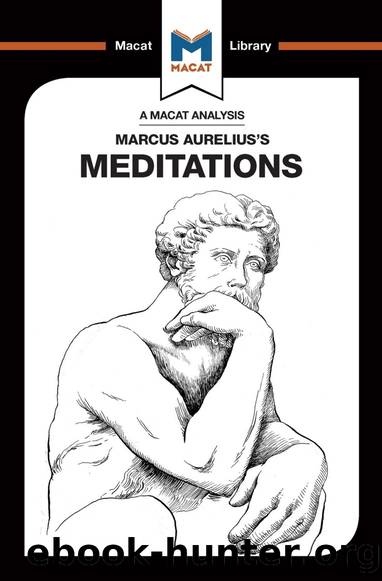An Analysis of Marcus Aurelius's Meditations by James Orr

Author:James Orr [Orr, James]
Language: eng
Format: epub
ISBN: 9781912303083
Amazon: 1912303086
Publisher: Macat Library
Published: 2017-07-28T05:00:00+00:00
Given that Marcus appears to have written Meditations with no reader in mind other than himself, it is curious that the work contains so little autobiographical information.
Marcus comes closer than any other figure from the ancient world to embodying the philosopher Platoâs* ideal of a philosopher-king.
Positioning
At one level, the task of positioning Meditations within Marcus Aureliusâs body of work is straightforward: the only other work of his to have survived is his correspondence with his tutor Fronto, which was discovered only in 1815 on reused parchment in a library in Milan. Nevertheless, a comparison between Meditations and the surviving letters offers valuable insights not only into Marcusâs personality but into his thinking. After all, Meditations itselfâthough very much an interior dialogueâreveals relatively little about how Marcus himself applied his principles of practical reasoning to his own daily life. Conversely, the letters reveal Marcusâs affection for his tutor: he prays frequently that Fronto be relieved from the many health troubles from which he suffered and constantly stresses the extent of his personal and intellectual debts to him. 1
Apart from Meditations and the correspondence with Fronto, there is no evidence from external sources that he wrote anything else. Given his position as emperor, however, it seems safe to assume that while Meditations may have been the only significant text that Marcus produced it is possible that he produced others that have not survived. Similarly, there is no way to determine how this text fits within the context of Marcusâs career. What is known, though, is that most of Meditations was written during the time that Marcus was engaged in a military campaign in the region of Dalmatia, in modern-day Croatia.
â Since there is no definite date concerning the chronology of the Meditations , it is impossible to assert that it is the work of a whole lifetime. Nevertheless, the fragmentary nature ⦠of the various chapters ⦠would lead us to think of a rather wide time span, maybe several years.â
Matteo Ceporina, âThe Meditations â
Integration
Given its practical focus, one of the most puzzling features of Meditations is that Marcus makes no effort in it to relate the ethical principles he promotes to his own life. In this respect, it is very different from a work like Confessions by the influential fourth- and fifth-century Christian* scholar Augustine,* a work that otherwise resembles Meditations in a number of respects. In sharp contrast to Augustine, Marcus cultivates a curiously detached tone and almost never attempts to illustrate a philosophical or ethical point by citing an event from his own life that might serve as an example. This can be a source of frustration for his readers, since the work represents a rare insight into the mind of a major historical figure who, during the last decade or so of his life (that is, after the death of his co-regent Lucius Verus)* was the single most important and powerful ruler in the world .
Still, this need not imply that Marcus failed to integrate his philosophical world
Download
This site does not store any files on its server. We only index and link to content provided by other sites. Please contact the content providers to delete copyright contents if any and email us, we'll remove relevant links or contents immediately.
The remains of the day by Kazuo Ishiguro(7575)
Tools of Titans by Timothy Ferriss(6964)
The Black Swan by Nassim Nicholas Taleb(6203)
Inner Engineering: A Yogi's Guide to Joy by Sadhguru(5910)
Giovanni's Room by James Baldwin(5893)
The Way of Zen by Alan W. Watts(5809)
The Six Wives Of Henry VIII (WOMEN IN HISTORY) by Fraser Antonia(4799)
The Power of Now: A Guide to Spiritual Enlightenment by Eckhart Tolle(4767)
Astrophysics for People in a Hurry by Neil DeGrasse Tyson(4627)
Asking the Right Questions: A Guide to Critical Thinking by M. Neil Browne & Stuart M. Keeley(4599)
12 Rules for Life by Jordan B. Peterson(3745)
The Ethical Slut by Janet W. Hardy(3511)
Skin in the Game by Nassim Nicholas Taleb(3477)
Housekeeping by Marilynne Robinson(3419)
The Art of Happiness by The Dalai Lama(3391)
Double Down (Diary of a Wimpy Kid Book 11) by Jeff Kinney(3284)
Skin in the Game: Hidden Asymmetries in Daily Life by Nassim Nicholas Taleb(3271)
Walking by Henry David Thoreau(3236)
12 Rules for Life: An Antidote to Chaos by Jordan B. Peterson(3209)
